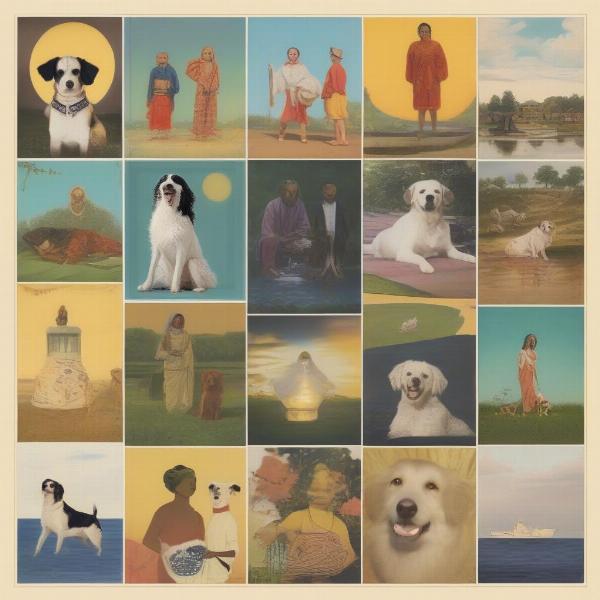The phrase “dog days represents the gentiles” is an unusual one, and likely stems from a misunderstanding or misinterpretation of historical and cultural references. While the “dog days” have a clear astronomical and meteorological origin, connecting them to “gentiles” lacks any historical or etymological basis. This article will explore the origins of the “dog days” and debunk the notion that they represent gentiles. We’ll delve into the history and meaning of this phrase, providing accurate and insightful information for dog lovers and history buffs alike.
The term “dog days” refers to the hottest, most sultry period of summer in the Northern Hemisphere. Traditionally, this period coincides with the heliacal rising of the star Sirius, also known as the “Dog Star,” in the constellation Canis Major (Greater Dog). Ancient cultures, including the Greeks and Romans, noticed this celestial event occurred during the hottest part of the year and associated it with heat, drought, and even bad luck. However, there’s no historical evidence linking this period to any religious or cultural group, particularly “gentiles.” The connection is purely coincidental and likely arises from a modern misinterpretation.
Understanding the Origin of “Dog Days”
The association of the “dog days” with Sirius stems from ancient observations of the night sky. The heliacal rising of Sirius, meaning its first appearance in the dawn sky after a period of being hidden by the sun, coincided with the hottest part of summer. This led to the belief that Sirius’s heat, added to the sun’s, was responsible for the extreme temperatures. This belief, though scientifically inaccurate, persisted for centuries and influenced various cultures’ understanding of the summer season.
Debunking the “Gentiles” Connection
The term “gentiles” refers to people who are not Jewish. There is no historical, religious, or linguistic link between the “dog days” and this term. The connection likely arises from misinterpretation or a conflation of unrelated concepts. It’s important to separate factual historical information from unfounded claims, and in this case, there’s no evidence to support the idea that “dog days represents the gentiles.”
The “Dog Days” in Different Cultures
While the astronomical origin of the “dog days” is consistent across cultures, the specific beliefs and traditions associated with this period vary. Some cultures viewed it as a time of misfortune and illness, while others saw it as a period of rest and relaxation.
 Cultural interpretations of Dog Days
Cultural interpretations of Dog Days
How the Ancient Romans Viewed Dog Days
The Romans, for instance, sacrificed a brown dog to the star Sirius in hopes of appeasing its heat and preventing drought.
Dog Days in Modern Times
Today, the “dog days” are mostly understood as a metaphorical expression for the hottest part of summer. While the astronomical connection is still recognized, the superstitions and rituals associated with it have largely faded.
Separating Fact from Fiction
It’s crucial to critically examine information and rely on credible sources, especially when exploring historical and cultural topics. The connection between “dog days” and “gentiles” lacks any factual basis and appears to be a misinterpretation. Understanding the true origins of the phrase allows us to appreciate the rich history and cultural significance of our relationship with the celestial world.
In conclusion, the “dog days” are a fascinating example of how ancient observations of the natural world intertwined with cultural beliefs. While they are historically linked to the star Sirius and the summer heat, there is no legitimate connection to the term “gentiles.” Understanding the true meaning and origin of this phrase helps us appreciate the rich tapestry of human history and our ongoing fascination with the cosmos.
FAQ:
- What are the dog days? The dog days are the hottest, most sultry period of summer, typically occurring from July 3 to August 11.
- Why are they called dog days? They are named after the star Sirius, known as the “Dog Star,” whose heliacal rising coincided with this hot period.
- Is there a connection between dog days and gentiles? No, there is no historical or etymological basis for this connection.
- What did ancient cultures believe about the dog days? Many cultures associated the dog days with heat, drought, illness, and sometimes bad luck.
- How are the dog days understood today? Today, they are primarily understood as a metaphor for the hottest part of summer.
ILM Dog is your trusted resource for all things dog-related. We provide expert advice on dog breeds, health, training, nutrition, grooming, and much more. Whether you’re a new dog owner or a seasoned expert, ILM Dog has the information you need to care for your canine companion. Contact us today for all your dog-related inquiries! Email: [email protected], Phone: +44 20-3965-8624. Visit ILM Dog for more valuable insights and resources.